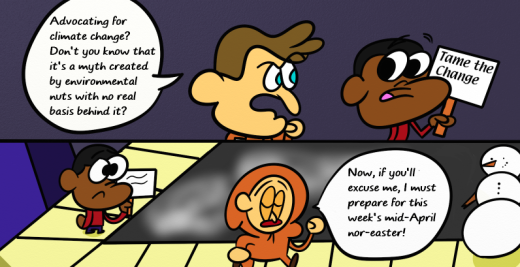
Many Americans do not view climate change as a threat. Instead, we are blinded by the fact that we do not feel the harsh effects of it. While it is true that most Americans do not feel any real effects of climate change in our day to day lives, it still remains a huge threat to our world and is continuing to affect the poor and vulnerable first.
Think about how much coffee is sold at Jazzman’s every day, how much food is wasted in the cafeteria and how many snow days we have had this year compared to last year. Climate change is already affecting each and every one of us and will continue to get worse if we do not speak up and take action.
Over the course of this century, greenhouse gas emissions are expected to raise surface temperatures to dangerous levels, with that comes damaging heat waves, harsh rain storms, crop killing droughts and other unpredictable weather patterns.
As developed Americans, we import crops, have subsidies to insure the farming industry and obtain necessary resources to protect ourselves from the effects of climate change. However, on the other, we still contribute to food waste, electricity overuse, landfills and huge factories.
We stand as both the cause and the solution of climate change. Even though we have the resources to protect ourselves from our own consequences, poverty struck countries do not.
Take a man such as Carlos, for example. In 1998, Carlos’ family began a coffee farming livelihood from scratch in Guatemala. While it was difficult to teach themselves how to properly grow coffee beans, every season got easier until the 2012 coffee leaf rust.
“La roya,” in Spanish, is a type of crop killing fungus that strangles the leaves of the crop, leaving the plant to be unable to breathe. This fungus has been around for years. However, it has affected more farmers, like Carlos, over the past 5-7 years, specifically due to the hot and humid days and unpredictable rains brought about by climate change.
Millions of Americans rely on coffee to get them through their day, while millions of Guatemalans rely on coffee to get them through their life.
Carlos and many other farmers are living proof of how American emissions affect poor communities elsewhere, directly due to the lack of resources to mitigate. If we cut funding towards poverty focused development assistance, this problem will only get worse. The imports we receive from countries like Guatemala will increase. Imagine your morning cup of coffee being even more expensive than it already is.
Progress has already been made in regulating our own emissions and helping poor countries mitigate to the consequences from climate change. Government funding that goes towards organizations like Catholic Relief Services not only help teach the people in the communities new farming techniques such as raised beds, but provide them with the necessary resources for it.
Although progress had been made, it is not enough for how rapidly the climate is changing. Increasing the funding towards poverty focused development assistance is key in order to get these farmers back on their feet and back in the global market, exporting goods like the coffee that so many of us drink daily.
Through the works of Mother Cabrini and the care for all God’s creation, we truly are an interconnected world. Everyone benefits when we help each other in need. We should care about these issues, even as college students.
The current Trump administration and the Environmental Protection Agency (EPA) is against climate change policy and has already repealed the Clean Power Plan and has taken the United States out of the Paris Agreement. By doing so, the United States is falling behind other countries when it comes to a sustainable environmentally friendly future.
Voting for politicians in the climate solutions caucus, using reusable water bottles and recycling containers and plastic are small-manageable acts that we can take every single day to help lessen this problem. Climate does not discriminate. Even if we don’t feel drastic effects from it now, it is going to continue to worsen at a rapid pace.

To learn what Cabrini students are doing to influence federal policy on climate change, see Lobbying against climate change; Cabrini students take on Washington D.C.



